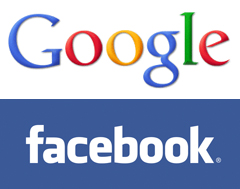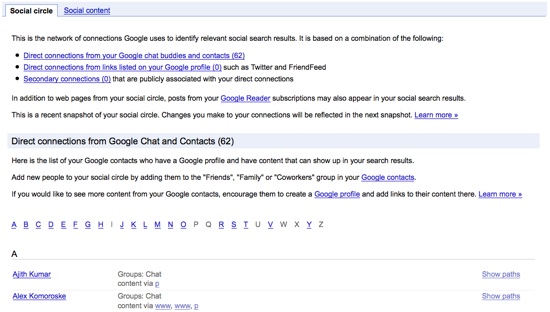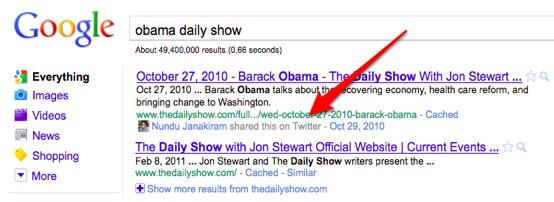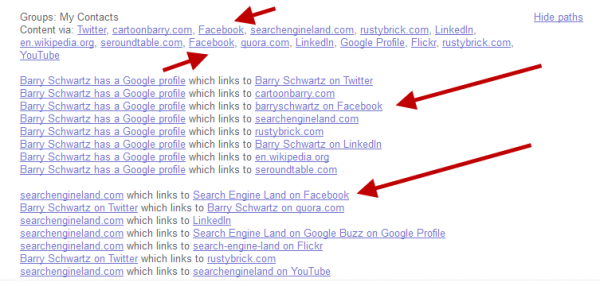Examining Facebook’s “Smear Campaign” Concerns About Google Social Circles
I read the news today, oh boy. The Facebook army had just declared a war. Well, a smear campaign against Google. For the record, Facebook denies that it actually ran such a campaign, but it does confirm it has issues with how Google is using some of Facebook’s social data. Do those allegations stand up? […]
 I read the news today, oh boy. The Facebook army had just declared a war. Well, a smear campaign against Google. For the record, Facebook denies that it actually ran such a campaign, but it does confirm it has issues with how Google is using some of Facebook’s social data. Do those allegations stand up? Let’s take a look.
I read the news today, oh boy. The Facebook army had just declared a war. Well, a smear campaign against Google. For the record, Facebook denies that it actually ran such a campaign, but it does confirm it has issues with how Google is using some of Facebook’s social data. Do those allegations stand up? Let’s take a look.
The required prerequisite reading is the Daily Beast article talking about the PR campaign that Facebook attempted. Also see reactions to the news in this Techmeme roundup.
Let’s start with the allegations. I emailed over to Facebook:
So I read the Daily Beast article. Does anyone want to talk in more detail about what exactly it is that Google’s doing with your data that you feel is improper?
I’ve actually asked Google several times about why they aren’t doing more with Facebook data, because as best I can tell, they pretty much haven’t been using it at all. So I’d like to understand more.
Facebook replied:
No ‘smear’ campaign was authorized or intended. Instead, we wanted third parties to verify that people did not approve of the collection and use of information from their accounts on Facebook and other services for inclusion in Google Social Circles—just as Facebook did not approve of use or collection for this purpose. We engaged Burson-Marsteller to focus attention on this issue, using publicly available information that could be independently verified by any media organization or analyst. The issues are serious and we should have presented them in a serious and transparent way.
You and your readers can look at the feature and decide if they have approved of this collection and use of information by clicking here when their Google account is open: https://www.google.com/s2/search/social. Of course, people who do not have Gmail accounts are still included in this collection but they have no way to view or control it.
OK, as it happens, I know a few things or two about the Google Social Circles product. Like, I saw it before it ever when public and wrote about it when it did. Like, it’s actually called Google Social Search, for another. I’ve also tracked the Google-Facebook squabble over Facebook’s data as it has heated up. Let’s dive in.
Google Social Circles Launches
Google Social Search — which used the Social Circle feature — launched in October 2009 as an experimental feature. Google Social Search Launches, Gives Results From Your Trusted “Social Circle” is my detailed article about it, from the time.
When Google Social Search launched, it allowed you to see things that people you know had created and posted on the public web. It would highlight content from your friends.
Nothing that Google Social Search presented was “private” content that was somehow magically pulled out of Facebook or other social networking services. All the content was on the public web, being found by Google already, unless publishers deliberately had blocked it from being in Google and other search engines.
But did Google use “private” information from other services to figure out who your friends were? No. Google had three methods of creating your “Social Circle,” as it was dubbed in the product. Two involved data from Google itself, and one depended on people adding links to their Google Profiles.
In the first Google method, if you had a Google Reader account, that was used to understand what sites you subscribed to, as a way of making those sites themselves part of your trusted social circle.
In the second Google method, if you had Gmail chat or Gmail contacts, they’d be part of your social network. This didn’t happen unless you deliberately chose to enable the Google Social Search service. Your friends also weren’t listed publicly. In fact, you couldn’t even see your own social circle.
In the third method, using information outside of Google, people could add links to their Google Profile page that lead to other social sites. Here’s how the Google Profiles “Links” option it looked back then:
Once you linked up a social site, Google could look at pages on those sites — public pages that anyone could see — to understand who you might be connected to. As I explained back then:
- Google sees I have a friend on Twitter
- That friend links to their blog from their Twitter profile
- Google understands that they are connected to that blog
- The friend’s blog has a link to their Flickr account
- Google may understand, then, that the person I know on Twitter is also related to their Flickr account, even if that account wasn’t listed on their Twitter profile
Google Social Search Gains “Social Circle” Feature
In January 2010, Google Social Search went live for everyone who wanted it. Google Social Search Goes Live, Adds New Features is our story from the time that covers it.
As a new feature, you could actually see the people in your “social circle” for the first time. Here’s an example of how that looked:
Down at the bottom, individuals in your circle were shown. You could also use the “show paths” feature to better see how you were connected to them to see content that was shared.
Later in 2010, Google made Google Buzz another option that helped feed into Google Social Search. Sites that you connected to your Google Buzz account could be used to power the sites considered to be part of your “Social Circle.” If the moon was full, and the tides were right, that is. It didn’t always work, I found.
Google Social Search Gets Integrated, Includes Shared Content
In February 2011, Google Social Search was no longer restricted to showing up at the bottom of Google’s search results. Instead, the service integrated social content anywhere within the regular search results.
In addition, rather than just showing social content that was created by your friends, it now began to show content that your friends may have shared through services like Twitter.
Our story from earlier this year — Google’s Search Results Get More Social; Twitter As The New Facebook “Like” — goes into much more depth about the change. Here’s an example of how the sharing looked then:
No Facebook Info Used, Officially
In that example above, you can see how something that someone shared on Twitter was being flagged that way through a social search annotation. But what wasn’t being highlighted, as our article detailed, was anything being shared on Facebook. From the story:
Despite Google’s wide expansion of Social Search, the changes don’t include any Facebook “Like” activity, even if you’ve added your Facebook page to your social profile.
Why not? [Google’s] Cassidy said generally: “This is just the beginning, and we’re going to be doing much more to improve the comprehensiveness of Google Social Search.”
Facebook and Google do have a deal that allows Google to use Facebook fan page information in the completely separate Google Realtime Search service. I’ll come back to that in a moment. But Google Social Search doesn’t have Facebook data at all, not at the time we last wrote about it in February.
I’m reconfirming the situation. Perhaps Google Social Search quietly gained Facebook content since February. Certainly the “Social Connections” tab within Google Social Search suggests this.
Google Social Circle Vs. Google Social Circles
I’ve been talking all about Google Social Search, not Google Social Circles, the thing that Facebook is all upset about. But that’s been necessary, because there is no “Google Social Circles” product that’s live and on the web.
There was a Google Social Circle (singular) feature that was part of Google Social Search, when it launched. But that was quietly renamed at some point over the past year. Meanwhile, a new Google Social Circles product is rumored to be coming.
When Google +1 launched in March, it created an entirely independent network of people that you could see +1 data from, based on:
- People in your Gmail & Google Talk chat list
- People in your “My Contacts” group in Google Contacts
- People you follow in Google Reader or Google Buzz
There was no option for adding connections to non-Google services like Twitter or Flickr or Facebook. Only Google services were involved.
In writing about that, I also went back to Google Social Search and noticed that the “social circle” name that had been used for connections there had been changed. As I wrote (and I’ll bold the key parts).
What’s confusing, perplexing or otherwise odd is that Google already allows you to create a social network that combines contacts from Google-based services (such as Google Buzz) with your networks from third-party sites like Twitter.
Google does this as part of its Google Social Search service. This combined network used to be called your “Social Circle” on Google, back when Google Social Search launched formally in January 2010 (it was an experiment before that). That launch also provided a way to view your social circle.
You can still view your social circle here on Google, but now these are called your “social connections.” I’m not sure when the name was changed, but I suspect it was dropped fairly recently, in the wake of a rumor earlier this month that Google was about to launch a “Google Circles” social network. Google’s help page still talks about your “social circle.”
All your social connections are used to help power Google Social Search results. But only your Google-based connections, right now, will power +1 matches within Social Search. Officially, Google says this is because it wants to start conservatively with +1, ramp up slowly and make sure everything works.
So Google “Social Circles” remains a forthcoming rumored product. Google “Social Circle” is the former name of “Social Connections” now shown to those who use Google Social Search. Facebook, I think, is concerned about the former while pointing at the latter.
Facebook & Google Social Circles
While Google Social Circles remains a rumored product, if it’s real, there should be plenty of Google refugees who now work at Facebook who know about it. They’d be understandably concerned that some new Google product might hope to suck up social connections that people have formed on Facebook.
Add to this is that the new Google +1 service is actually live. While officially, Google says it’s not a social network but rather an extension of search, +1 buttons are about to spring up across the web in a matter of weeks as a rival to Facebook Like buttons.
For those buttons to really fly, the need to be hooked up to a way for people to easily share what they +1 with others. Google has nothing like that now. But perhaps in conjunction with the buttons going live, we’ll see a Google Social Circles product launch. And potentially, Google might try to pull Facebook data into that. As I wrote from the Google +1 launch:
Beyond web page ranking, the new +1 button potentially allows Google to leverage search to build its own robust “social graph” or “view” of how people are connected to each other. Right now, Google can see some connections, such as people who tweet to each other. But +1 may allow Google to see more direct connections.
Google has been especially hobbled in that Facebook is unwilling to let people export their contacts directly to Google. Meanwhile, Google keeps saying that there’s something in Facebook’s terms and conditions that prevent it from using Facebook Connect to link to Facebook’s social data in the way that even tiny Blekko does.
That something, as best I can tell, is that Google doesn’t want Facebook to see inside its network, in the way that Facebook would like. But getting a straight answer from either company just doesn’t work. They remain at a standoff.
Facebook & Google Social Circle / Social Connections
While the above is speculation, we do know that Facebook right now is specifically pointing to the “Social Connections” part of Google Social Search and, from the email I was sent, raising concerns. Again, from that email, and I’ll bold the key parts.
Instead, we wanted third parties to verify that people did not approve of the collection and use of information from their accounts on Facebook and other services for inclusion in Google Social Circles—just as Facebook did not approve of use or collection for this purpose. We engaged Burson-Marsteller to focus attention on this issue, using publicly available information that could be independently verified by any media organization or analyst. The issues are serious and we should have presented them in a serious and transparent way.
You and your readers can look at the feature and decide if they have approved of this collection and use of information by clicking here when their Google account is open: https://www.google.com/s2/search/social. Of course, people who do not have Gmail accounts are still included in this collection but they have no way to view or control it.
I’m a third party, so let me do some verification.
Weak: Collection Of Information From Others Without Approval
Is Google collecting information into Google Social Search from other sites without permission? It depends on whose information and permission that we’re talking about.
Google collects content from all over the web without explicitly asking permission of publishers, a system that aside from some very tiny bumps has worked well, since publishers can easily block Google.
In collecting this information, Google (like Bing and other search engines) is going to collect things that the authors of material might not have given explicit permission to collect.
For example, if you tweet something, you authored that tweet. Twitter published it. Google collected it, and made it visible in web search. Google didn’t ask the author for permission to list it in web search, but neither was it blocked by the publisher from doing so.
So yes, Google collects information from others, including Facebook, which over the years has deliberately caused more of the information it publishes from authors (its users) to be made public in order to gain traffic from Google and other places.
I will say that one concern is that I have is that at some point, Social Search became a product that you couldn’t opt out of. I’m not sure exactly when this happened. But in our last story from February, we wrote:
If you’ve never linked your Google Profile to any of your social networks — and you don’t make use of any of Google’s own social features, such as Google Reader, then you shouldn’t see social results appearing in your listings.
If you have linked your social accounts, you might wish to see “regular” results that haven’t been “socialized,” so to speak. You can only do this by logging out of Google. Otherwise, there’s no option to disable them from being blended.
Google needs to provide an “off” button, for those who want it. But still, even with the default “on,” data from services outside of Google isn’t being pulled in unless someone deliberately chooses to create a Google Profile with links to their social accounts.
Unclear: Collection Of Facebook Information Without Approval
Is Google collecting information into Google Social Search from Facebook without permission? No, not that I can see, fro my own testing. Google Social Search, as I’ve explained, also says it doesn’t list any Facebook data at all. This is despite the fact that Google has an agreement that allows some of this same data to be shown in Google Realtime Search.
If Facebook’s own content isn’t being used, how about Facebook information, in a way that Facebook doesn’t permit? For example, is Google somehow mining Facebook’s connections to build social search connections? Maybe. And maybe that’s fine.
Remember that link that Facebook said to check out? Here’s an examples of what I see from my connections on it:
That’s for my connection with Barry Schwartz, my news editor here on Search Engine Land. I’m told in the “Content via” line that I’ll get content related to him from Facebook in two different ways (thus the two arrows).
Below that, I’ve given the exact details. One method might be that I’ll get content from him via his Facebook page. The second is that he’s connected to our Search Engine Land page at Facebook, so I might get content from him that way.
Barry’s Facebook page is listed in Google, so Facebook itself is publishing it to Google. It seems odd to then object that Google is using material that might be on it, especially when Facebook has an explicit option that allows people to block search engines from reading their pages, if the user wants.
Google — or any logged out user — only sees a limited amount of information on that page, anyway. A few friends will be listed, along with some key details about Barry. But that’s it.
Potentially, Google is mining the Facebook Open Graph or linking ordinary links that it finds back to the graph, in ways that Facebook doesn’t like. But this is unclear.
Certainly, it’s odd that Google is saying that Facebook content is being used on the Social Connections page when it has said that it’s not being used in Google Social Search, in the past. I’m checking on this.
But having said that, there’s nothing that should be showing up on the web at all from Facebook that’s not already public. Indeed, our fan page that Barry’s connected to? Any action that Facebook users take on a fan page is public to the world, because that’s how Facebook has made it.
Wrapping Up
Really, you made it this far? Bottom line time. I can’t see that Google is using any information in Google Social Search from Facebook.
I can see that Facebook profiles do get listed in the Social Connections area. This might really be a harbinger of things to come, rather than something that’s happening now. But that might be a harbinger that Facebook’s worried about.
If Google does have content in Google Social Search from Facebook, then as best I can tell, any of that is already public, published by Facebook itself.
If Facebook really wants to present things in a transparent way, in the way it says it does, then I’d like to see a blog post explaining in detail the concerns it has with Google.
I’m waiting to see if I can get someone on the phone from Facebook to talk through these issues more. It’s been over two hours now. If I do, I’ll have more. At least Facebook got back with me with an emailed statement within minutes after my request. As for Google, I’m still waiting for anything at all.
Related Stories
- Google Settles FTC Charges Over Buzz, Agrees To 20 Years Of Privacy Audits
- Mine The Web’s Socially-Tagged Links: Google Social Graph API Launched
- Google Social Search Launches, Gives Results From Your Trusted “Social Circle”
- Google’s Search Results Get More Social; Twitter As The New Facebook “Like”
- Meet +1: Google’s Answer To The Facebook Like Button
- Just Weeks Away, A Preview Of The Google +1 Button For Websites
- Blekko, Bing & How Facebook Likes Are Changing Search
- Bing Integrates Facebook Likes Further Into Its Search Results
- Facebook: You’ve No Right To Export Email Addresses (Unless It’s To Yahoo & Microsoft
- Facebook On Social Search: ‘We Want To Work With Everybody’
- Google & Facebook: If You’re So Smart, Work It Out!
- Has Facebook Become The Master Key To Unlocking The Web?
Postscript: Also see How Facebook Enables The Google Social “Scraping” It’s Upset About
Contributing authors are invited to create content for Search Engine Land and are chosen for their expertise and contribution to the search community. Our contributors work under the oversight of the editorial staff and contributions are checked for quality and relevance to our readers. The opinions they express are their own.
Related stories
New on Search Engine Land



